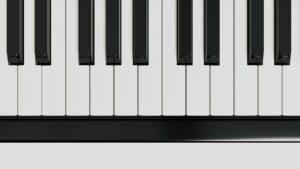In the dynamic world of music, technology has proven to be a game-changer. It’s reshaping the way we create, distribute, and consume music. But how can one stay ahead in this rapidly evolving field? The answer lies in a music technology degree.
This degree serves as a bridge, connecting the age-old love for music with the cutting-edge advancements in technology. It’s the perfect blend for those with a passion for rhythm and a knack for tech.
Stay tuned as we delve into the world of music technology degrees. We’ll explore what they entail, the career prospects they offer, and why they might just be the key to unlocking your future in the music industry.
Music Technology Degree
 A music technology degree, as its name implies, marries the art of music with the power of technology. This multidisciplinary field of study is explored in detail below.
A music technology degree, as its name implies, marries the art of music with the power of technology. This multidisciplinary field of study is explored in detail below.
A music technology degree involves a unique blend of music theory, digital sound production, and various technical aspects related to the music industry. As a student, one doesn’t simply learn to compose, perform, or teach music—instead, they dive into how to capture, produce, and manipulate sounds using modern technology. Think along the lines of sound engineering, music production, acoustic design, and multimedia programming.
For instance, imagine studying the fundamentals of music, from theory to composition, and then adding a layer of complex, tech-oriented topics like digital automation, advanced audio processing, sound recording, and music informatics. Ultimately, a music technology degree equips students with the skills they require to leverage technological advancements in today’s music industry.
Career Paths in Music Technology
The choice of career paths for graduates in music technology is diverse, far-reaching, and brimming with potential. Among the typical options are roles like sound engineer, music producer, or live sound technician. However, digitization has expanded the landscape to include a range of other lucrative opportunities.
Looking at various job descriptions, one can find positions like Music Informatics Specialist, where one taps into the science of music information retrieval and digital information processing.
Key Components of Music Technology Education
 Once deciding to propel your passion for music and technology to an academic platform, understanding the key educational elements is crucial. This section uncovers the principal aspects: the specific coursework and the significance of gaining hands-on experience.
Once deciding to propel your passion for music and technology to an academic platform, understanding the key educational elements is crucial. This section uncovers the principal aspects: the specific coursework and the significance of gaining hands-on experience.
A comprehensive music technology degree comprises specialized classes that span across music theory, sound engineering, music production and audio software. Students also undertake classes in digital audio, electronic music, and even coding. With a curriculum forged on a blend of artistic creativity and technological fluency, it offers an interdisciplinary approach. For instance, students grasp the nuances of audio signal processing, MIDI programming, and music informatics. Additionally, areas like digital scoring, sound synthesis, and multimedia applications hold weight in the overall curriculum structure.
In the realm of music technology, practical application bears as much significance as theoretical knowledge does. In fact, it’s what brings the educational journey alive. Consequently, programs often integrate internships, studio work, and live sound experiences.
The Impact of Digital Evolution on Music Technology
 The digital revolution brings transformative changes to music technology. It’s led to a seismic shift in how music is produced, consumed, and monetized, effectively reshaping the music industry. Through this, new opportunities arise in the sector, fostering innovation, diversification, and growth.
The digital revolution brings transformative changes to music technology. It’s led to a seismic shift in how music is produced, consumed, and monetized, effectively reshaping the music industry. Through this, new opportunities arise in the sector, fostering innovation, diversification, and growth.
Waves of cutting-edge technologies have overhauled traditional music production practices. For instance, Digital Audio Workstations (DAWs) offer comprehensive tools for recording, editing, and mixing music, sidelining the need for bulky hardware. MIDI technology (Musical Instrument Digital Interface) allows musicians to control and communicate with electronic devices, bringing unheard-of flexibility to composition.
Moreover, advancements in AI (Artificial Intelligence) empower data-driven music creation, fostering new genres and styles. In particular, AI algorithms can analyze music patterns, structure, and composition, leading to automated composition of music tracks.
Digital evolution in music technology uncovers a multitude of career opportunities. For instance, audio software engineers harness the power of music technology platforms to streamline music production. In turn, sound engineers use modern tech tools like DAWs and sound editing software to reduce disturbances and enhance music quality.

